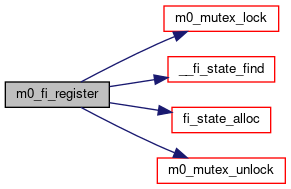Fault Injection API provides functions to set "fault points" inside the code, and functions to enable/disable the failure of those points. It's aimed at increasing code coverage by enabling execution of error-handling code paths, which are not covered otherwise by unit tests. More...
Data Structures | |
| struct | m0_fi_fault_point |
| struct | m0_fi_fpoint_data |
Macros | |
| #define | M0_FI_ENABLED(tag) |
Typedefs | |
| typedef bool(* | m0_fi_fpoint_state_func_t) (void *data) |
Enumerations | |
| enum | m0_fi_fpoint_type { M0_FI_ALWAYS, M0_FI_ONESHOT, M0_FI_RANDOM, M0_FI_OFF_N_ON_M, M0_FI_FUNC, M0_FI_INVALID_TYPE, M0_FI_TYPES_NR } |
Functions | |
| M0_INTERNAL int | m0_fi_init (void) |
| M0_INTERNAL void | m0_fi_fini (void) |
| M0_INTERNAL void | m0_fi_print_info (void) |
| M0_INTERNAL void | m0_fi_enable_generic (const char *fp_func, const char *fp_tag, const struct m0_fi_fpoint_data *fp_data) |
| static void | m0_fi_enable (const char *func, const char *tag) |
| static void | m0_fi_enable_once (const char *func, const char *tag) |
| static void | m0_fi_enable_random (const char *func, const char *tag, uint32_t p) |
| static void | m0_fi_enable_off_n_on_m (const char *func, const char *tag, uint32_t n, uint32_t m) |
| static void | m0_fi_enable_each_nth_time (const char *func, const char *tag, uint32_t n) |
| static void | m0_fi_enable_func (const char *func, const char *tag, m0_fi_fpoint_state_func_t trigger_func, void *data) |
| M0_INTERNAL void | m0_fi_disable (const char *fp_func, const char *fp_tag) |
| void | m0_fi_register (struct m0_fi_fault_point *fp) |
| bool | m0_fi_enabled (struct m0_fi_fpoint_state *fps) |
| M0_INTERNAL enum m0_fi_fpoint_type | m0_fi_fpoint_type_from_str (const char *type_name) |
| M0_INTERNAL int | m0_fi_enable_fault_point (const char *str) |
| M0_INTERNAL int | m0_fi_enable_fault_points_from_file (const char *file_name) |
Detailed Description
Fault Injection API provides functions to set "fault points" inside the code, and functions to enable/disable the failure of those points. It's aimed at increasing code coverage by enabling execution of error-handling code paths, which are not covered otherwise by unit tests.
Macro Definition Documentation
◆ M0_FI_ENABLED
| #define M0_FI_ENABLED | ( | tag | ) |
Defines a fault point and checks if it's enabled.
FP registration occurs only once, during first time when this macro is "executed". m0_fi_register() is used to register FP in a global dynamic list, which may introduce some delay if this list already contains large amount of registered fault points.
A typical use case for this macro is:
It creates a fault point with tag "pretend_failure" in function "m0_alloc", which can be enabled/disabled from external code with something like the following:
- See also
- m0_fi_enable_generic() for more details
- Parameters
-
tag short descriptive name of fault point, usually separated by and uniquely identifies this FP within a current function
- Returns
- true, if FP is enabled
- false otherwise
Typedef Documentation
◆ m0_fi_fpoint_state_func_t
| typedef bool(* m0_fi_fpoint_state_func_t) (void *data) |
Enumeration Type Documentation
◆ m0_fi_fpoint_type
| enum m0_fi_fpoint_type |
Fault point types, which determine FP behavior in enabled state.
Function Documentation
◆ m0_fi_disable()
| M0_INTERNAL void m0_fi_disable | ( | const char * | fp_func, |
| const char * | fp_tag | ||
| ) |
Disables fault point, which identified by "func", "tag" pair.
- Parameters
-
fp_func Name of function, which contains a target FP fp_tag FP tag, which was specified as a parameter to M0_FI_ENABLED()
Definition at line 485 of file finject.c.

◆ m0_fi_enable()
|
inlinestatic |
Enables fault point, which identified by "func", "tag" pair, using M0_FI_ALWAYS FP type.
- Parameters
-
func Name of function, which contains the target FP tag FP tag, which was specified as a parameter to M0_FI_ENABLED()
- See also
- m0_fi_enable_generic() and m0_fi_fpoint_type for more details
Definition at line 276 of file finject.h.

◆ m0_fi_enable_each_nth_time()
|
inlinestatic |
A wrapper around m0_fi_enable_off_n_on_m() for a special case when N=n-1 and M=1, which simply means to trigger FP each n-th time.
- Parameters
-
func Name of function, which contains the target FP tag FP tag, which was specified as a parameter to M0_FI_ENABLED() n A "frequency" with which FP is triggered
Definition at line 366 of file finject.h.


◆ m0_fi_enable_fault_point()
| M0_INTERNAL int m0_fi_enable_fault_point | ( | const char * | str | ) |
Definition at line 103 of file finject_init.c.
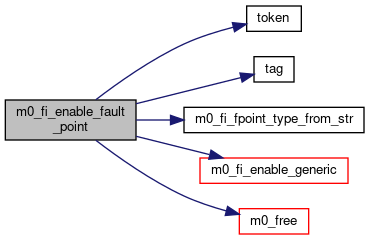

◆ m0_fi_enable_fault_points_from_file()
| M0_INTERNAL int m0_fi_enable_fault_points_from_file | ( | const char * | file_name | ) |
Definition at line 258 of file finject_init.c.


◆ m0_fi_enable_func()
|
inlinestatic |
Enables fault point, which identified by "func", "tag" pair, using M0_FI_FUNC FP type.
- Parameters
-
func Name of function, which contains the target FP tag FP tag, which was specified as a parameter to M0_FI_ENABLED() trigger_func Pointer to a user-supplied triggering function data Pointer to store user's private data, which can be accessed from user-supplied triggering function
- See also
- m0_fi_enable_generic() and m0_fi_fpoint_data/m0_fi_fpoint_type for more details
Definition at line 387 of file finject.h.


◆ m0_fi_enable_generic()
| M0_INTERNAL void m0_fi_enable_generic | ( | const char * | fp_func, |
| const char * | fp_tag, | ||
| const struct m0_fi_fpoint_data * | fp_data | ||
| ) |
Enables fault point, which identified by "func", "tag" pair.
It's not intended to be used on it's own, a set of m0_fi_enable_xxx() wrapper functions should be used instead.
- Parameters
-
fp_func Name of function, which contains a target FP fp_tag FP tag, which was specified as a parameter to M0_FI_ENABLED() fp_type Specifies a type of "triggering algorithm" (
- See also
- enum m0_fi_fpoint_type)
- Parameters
-
fp_data Parameters for "triggering algorithm", which controls FP behavior (
- See also
- struct m0_fi_fpoint_data)
Definition at line 462 of file finject.c.
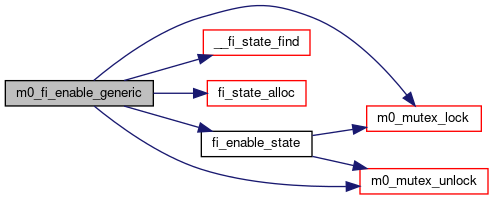
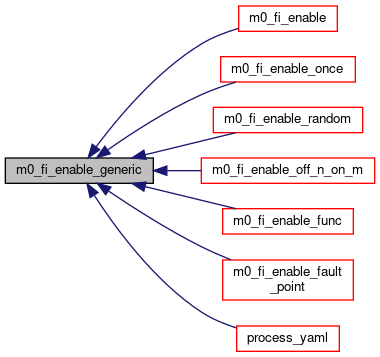
◆ m0_fi_enable_off_n_on_m()
|
inlinestatic |
Enables fault point, which identified by "func", "tag" pair, using M0_FI_OFF_N_ON_M FP type.
- Parameters
-
func Name of function, which contains the target FP tag FP tag, which was specified as a parameter to M0_FI_ENABLED() n Integer values, used as initialized for fpd_n field of m0_fi_fpoint_data structure m Integer values, used as initialized for fpd_m field of m0_fi_fpoint_data structure
- See also
- m0_fi_enable_generic() and m0_fi_fpoint_data/m0_fi_fpoint_type for more details
Definition at line 346 of file finject.h.


◆ m0_fi_enable_once()
|
inlinestatic |
Enables fault point, which identified by "func", "tag" pair, using M0_FI_ONESHOT FP type.
- Parameters
-
func Name of function, which contains the target FP tag FP tag, which was specified as a parameter to M0_FI_ENABLED()
- See also
- m0_fi_enable_generic() and m0_fi_fpoint_type for more details
Definition at line 301 of file finject.h.

◆ m0_fi_enable_random()
|
inlinestatic |
Enables fault point, which identified by "func", "tag" pair, using M0_FI_RANDOM FP type.
- Parameters
-
func Name of function, which contains the target FP tag FP tag, which was specified as a parameter to M0_FI_ENABLED() p Integer number in range [1..100], which means a probability in percents, with which FP should be triggered on each hit
- See also
- m0_fi_enable_generic() and m0_fi_fpoint_data for more details
Definition at line 321 of file finject.h.

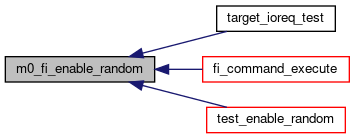
◆ m0_fi_enabled()
| bool m0_fi_enabled | ( | struct m0_fi_fpoint_state * | fps | ) |
Checks if fault point should "trigger" or not.
It's not intended to be used on it's own, instead it's used as part of M0_FI_ENABLED() macro.
- Parameters
-
fps A pointer to fault point's state structure, which is linked with FP's "descriptor"
- See also
- M0_FI_ENABLED() for more information
- Returns
- true, if FP is enabled
- false otherwise
Definition at line 445 of file finject.c.


◆ m0_fi_fini()
| M0_INTERNAL void m0_fi_fini | ( | void | ) |
Finalizes fault injection subsystem.
Definition at line 47 of file finject_init.c.


◆ m0_fi_fpoint_type_from_str()
| M0_INTERNAL enum m0_fi_fpoint_type m0_fi_fpoint_type_from_str | ( | const char * | type_name | ) |
◆ m0_fi_init()
| M0_INTERNAL int m0_fi_init | ( | void | ) |
Initializes fault injection subsystem.
Definition at line 40 of file finject_init.c.
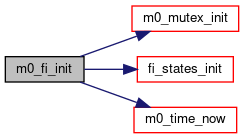

◆ m0_fi_print_info()
| M0_INTERNAL void m0_fi_print_info | ( | void | ) |
Prints to stdout information about current state of fault points formatted as table.
Definition at line 78 of file finject_init.c.


◆ m0_fi_register()
| void m0_fi_register | ( | struct m0_fi_fault_point * | fp | ) |
Registers fault point in a global list.
It's not intended to be used on it's own, instead it's used as part of M0_FI_ENABLED() macro.
- Parameters
-
fp A fault point descriptor
- See also
- M0_FI_ENABLED() for more information
Definition at line 423 of file finject.c.
